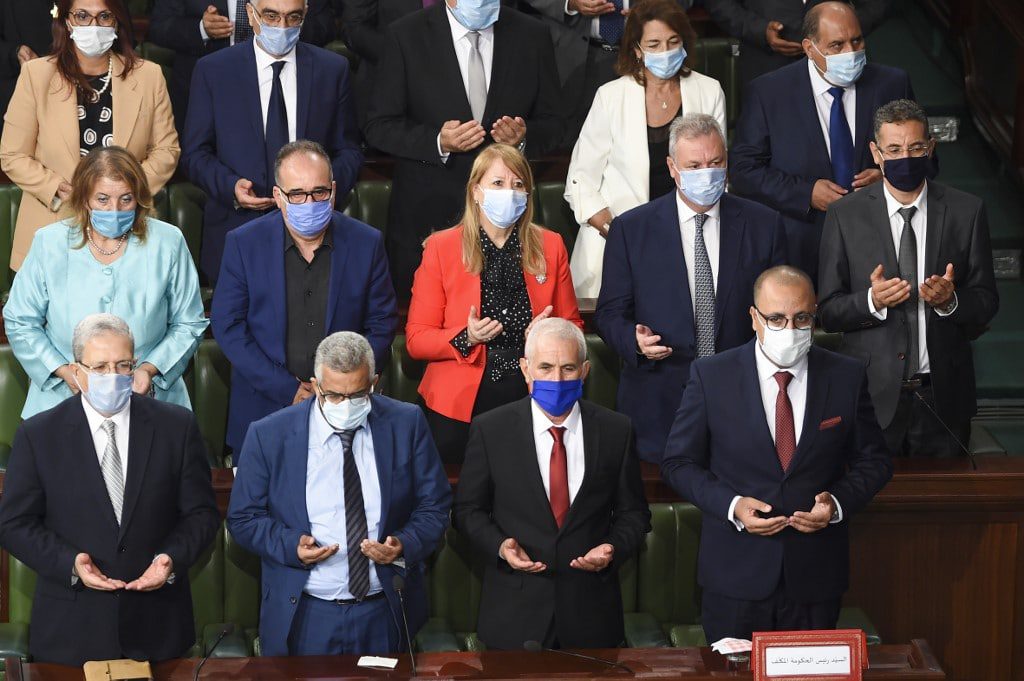
By: Mat Nashed
Tunisia’s parliament avoided unpopular early elections after approving its second government in six months on 2 September 2020. The new technocratic cabinet is now tasked with saving the country’s ailing economy and ending a political deadlock that has hampered progress in the North African nation since ousting former dictator Zine El Abidine Ben Ali in 2011.
The Prime Minister of the new government, Hichem Mechichi, was picked last month by President Kais Saied, a figure who has been at odds with rival parties in parliament. Mechichi, who is an independent candidate, revealed his cabinet a week before receiving a vote of confidence. His proposed cabinet was made up of legal experts and university professors, as well as individuals close to Kais Saied.
Despite being at odds with Saied, Tunisia’s largest party, the Islamist Ennahda, decided to support Mechichi’s government after admitting that it had reservations. Ennahda later explained that a government needed to be appointed in order to address the country’s most pressing issues.
For most Tunisians, no issue is bigger than the flagging economy, which was already struggling before entire industries were crippled by the Covid-19 pandemic. Tackling the economy will be Ali Kooli, a CEO of Arab Banking Corporation (ABC) in Tunisia. Kooli will be leading a revived department, which was born after the ministries of Finance, Investment and State Property were merged into one.
Kooli has his work cut out for him. The economy contracted by a staggering 23 percent in the second quarter of 2020, which amounts to the steepest decline in more than two decades. The tourism sector has particularly been devastated due to Covid-19. Between 2019 and March 2020, the monthly tourist revenue dropped from 93 million Euros to just 65 million. The UN World Tourism Organization estimates that tourism will slide by another 30 to 40 percent this year before gradually recovering.
Amid the hardship, the new government will have to secure a new loan from the IMF despite already owing debts of about $30 billion and $2.73 billion that are due this year. The conditions of the new loan could trigger unrest if Tunisia is required to impose acute austerity measures too soon. Grievances have long simmered in Tunisia’s interior, which traditionally suffers from widespread unemployment compared to the more developed coastal regions. Although the workforce in the coast has been devastated by covid-19, the pandemic has predictably exacerbated regional inequalities. Nevertheless, securing a new loan is vital to balance Tunisia’s annual budget and thus safeguard the value of its currency.
International Crisis Group (ICG), a non-profit in Belgium focused on resolving conflicts worldwide, suggests that Tunisia could improve livelihoods by dismantling clientelist networks that weaken decision making within its institutions. ICG added that Tunisia should also incorporate, wherever possible, non-illicit informal trade into the formal economy. That way, the Tunisian government may could tap into new markets to reduce its bloated bureaucracy, improve livelihoods and raise taxes.
The reasoning is sound considering that informal trade comprises roughly 40 percent of the country’s total GDP and about 32 percent of all employment. Taxing these economic activities could help Tunisia pay off its debts, while cracking down on illicit trade.
But Youssef Cherif, a Tunisian political analyst and the head of Columbia Global Centers, told Fanack that formalizing non-illicit trade is difficult without the support of grassroots activists and Tunisia’s most prominent trade unions: The Confederation of Industry, Trade and Handicrafts (UTICA) and the Tunisian General Labor Union (UGTT) “If the idea were proposed, it would need the support of big players like trade unions, or else it would lead to taxation, repression, and social unrest,” he explained.
Cherif further advises the new government to strike a balance between pleasing trade unions and maintaining good terms with international creditors and donors. He nonetheless anticipates that political infighting will continue to hamper reforms, a dilemma that is making many nostalgic for authoritarian rule.
Disadvantaged youth are particularly beginning to believe that only a strongman can bring positive change to Tunisia. In their eyes, the new political system has only succeeded in masking political cronyism and maintaining regional inequalities. And unless the new government addresses the economic grievances of the interior, nostalgia for authoritarianism will continue to grow. Wealthier citizens also frequently claim that Tunisians aren’t ready for democracy, or at least not a parliamentary one.
However, the greatest challenge to Mechichi’s technocratic government stems from the very man that appointed him. During the ceremony to introduce the new government, President Saied accused a number of unspecified politicians of treason and of conspiring against the state. But Mohamad Yousifi, an independent political analyst covering Tunisia, told Bloomberg that Mechichi will have little choice but to strike deals with some of Saied’s rivals.
Saied, for his part, has been accused of pressuring Mechichi to appoint his supporters to major posts in the new cabinet. If these accusations are proven true, it would amount to a serious abuse of Presidential power under the constitution. More alarming, Saied’s political meddling could dissuade Mechichi from cooperating with major political parties, thus leading to the dissolvement of government.
For now, International creditors and donors are keeping Tunisia afloat. The IMF, World Bank and the EU have given the country a combined $1.4 billion in aid. That money has enabled the government to provide a meager $70 to 700,000 people that lost their livelihoods due to the pandemic. However, relying on international creditors and donors isn’t a long-term solution. The government eventually has to address the very economic grievances that triggered popular unrest in 2011 if they hope to regain faith in the democratic process.
“The broader public doesn’t see the difference between a political and technocratic government,” said Cherif. “For them, they’re all men with fancy cars.”


